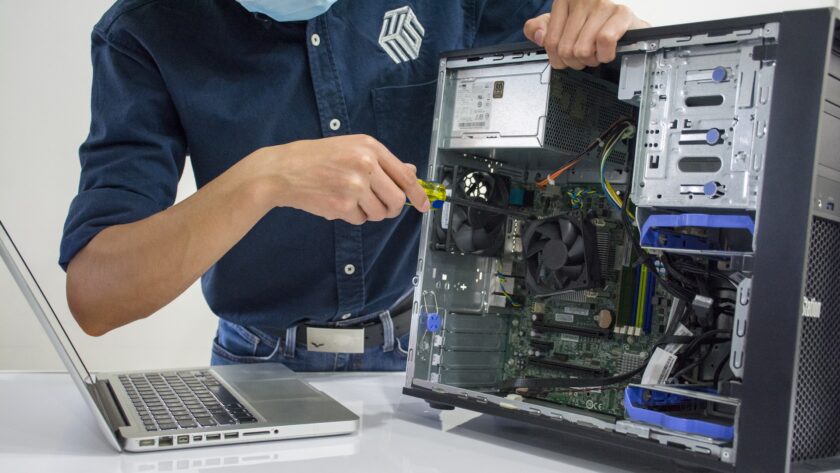In today’s digital age, technology is constantly evolving, and businesses must adapt to keep up with the changes. However, as technology becomes more complex and sophisticated, so do the threats that can affect business data and systems.
Businesses that fail to take proactive measures to protect their data and systems put themselves at risk of data breaches, cyber-attacks, and other security threats. In this blog post, we’ll explore why proactive IT services are vital for protecting business data and systems.
Improved Security Measures
Improved security measures are a crucial aspect of proactive IT services. With the rising number of cyber threats and data breaches in today’s digital age, providers of IT support in Glasgow, the UK, and worldwide advise that businesses must protect their sensitive data and systems. Proactive IT services can provide businesses with a wide range of security measures to help prevent data breaches and cyber-attacks, one of which is known as penetration testing. This method of security helps businesses identify vulnerabilities in their system before attackers can exploit them.
One of the most common security measures proactive IT services provide is firewalls. A firewall is essentially a barrier between a business’s internal network and the outside world, monitoring incoming and outgoing traffic to ensure that it is legitimate. A well-configured firewall can help prevent unauthorized access to a business’s network and systems.
Another security measure provided by proactive IT services is antivirus software. Antivirus software detects and removes malicious software, such as viruses and malware, from a business’s computers and networks. Antivirus software is essential for preventing cyber attacks that may result in data breaches or system disruptions.
Furthermore, proactive IT services can also provide intrusion detection and prevention systems (IDPS). IDPS is designed to detect and respond to potential attacks on a business’s network and systems. They can help prevent malicious actors from exploiting vulnerabilities in a business’s network and systems by detecting anomalous behavior and triggering an alert.
Lastly, proactive IT services provide another important security measure: employee education and training. Educating employees on best practices for staying safe online, such as password hygiene, identifying phishing emails, and proper internet usage, is critical in preventing security breaches. Human error is a common cause of data breaches, so educating employees on how to stay safe online is vital.
Early Detection and Resolution of Issues
Another benefit of proactive IT services is the ability to detect and resolve issues before they cause major problems. Proactive IT services can monitor a business’s network and systems 24/7 to identify potential issues before they cause significant disruptions or damage.
By detecting and resolving issues early, proactive IT services can help prevent costly downtime, data loss, and other negative impacts on a business’s operation. For example, if a proactive IT service detects a hardware failure, it can replace the impacted hardware before it fails completely, thereby minimizing the impact on the business.
Examples of issues that can be detected and resolved proactively include hardware failures, software crashes, and network outages. By addressing these issues proactively, businesses can avoid the costs and downtime associated with reactive measures.
Regular Software Updates and Maintenance
Regular software updates and maintenance are other essential aspects of proactive IT services. It involves keeping the software and systems up to date, fixing bugs and errors, and ensuring they run efficiently without disruptions.
Regular software updates are vital for preventing security breaches, as outdated software can pose significant security risks to a business. Hackers can exploit vulnerabilities in out-of-date software to orchestrate information breaches or gain unauthorized access to a business’s network and sensitive data. Regular software updates help patch these vulnerabilities and keep the systems secure.
Maintenance also includes routine hardware checks to identify and replace failing hardware components before they cause significant disruptions or damage. Regular maintenance helps ensure that the systems and software operate efficiently, minimizing the risk of downtime and other issues impacting a business’s operations.
Lastly, regular software updates and maintenance can also help improve system performance. Performance issues can lead to slow or unresponsive systems, which can decrease employee productivity and result in poor customer experiences. By keeping the systems up to date and maintained, proactive IT services can help ensure optimal system performance, improve efficiency, and reduce operational costs.
Disaster Recovery Planning
Proactive IT services can also help businesses develop disaster recovery plans that can help mitigate the impact of disasters or disruptions. Disaster recovery planning involves developing a plan for how a business will respond to and recover from a disaster or disruption.
Disasters or disruptions can take many forms, including natural disasters, cyber-attacks, power outages, and other events. A well-developed disaster recovery plan can help a business minimize the impact of these events and quickly return to normal operations. Disaster recovery planning typically involves identifying critical systems and data, developing procedures for responding to and recovering from disasters, and testing the plan to ensure that it works correctly. Proactive IT services can help businesses develop robust disaster recovery plans and ensure that they are regularly tested and updated.
Increased Efficiency and Productivity
Finally, proactive IT services can help businesses increase efficiency and productivity by automating repetitive tasks and streamlining workflows. By implementing automation and other productivity tools, proactive IT services can help businesses save time and reduce costs.
For example, proactive IT services can help businesses automate tasks such as data entry, report generation, and invoicing. This automation can help free up employees’ time to focus on more strategic tasks, such as business development and customer service.
In addition, proactive IT services can help streamline workflows by identifying areas where processes can be improved or eliminated altogether. By streamlining workflows, businesses can reduce the time it takes to complete tasks and improve overall efficiency and productivity.
In conclusion, proactive IT services are a must for any business that wants to protect its data and systems. They play a vital role in preventing security breaches, detecting and resolving issues early, ensuring regular software updates and maintenance, developing disaster recovery plans, and increasing efficiency and productivity. Without proactive measures, businesses are at risk of costly and damaging security threats that can have severe consequences for their operations.
Investing in proactive IT services may seem like an added cost, but it could save you money, time, and reputation in the long run by preventing costly security breaches and downtime. Working with a reputable IT service provider that can provide customized solutions tailored to your business needs is essential. Remember, the threat landscape is constantly evolving, and you must adapt to keep up. With proactive IT services in place, you can have peace of mind knowing that your business is secure, efficient, and competitive in today’s digital age





